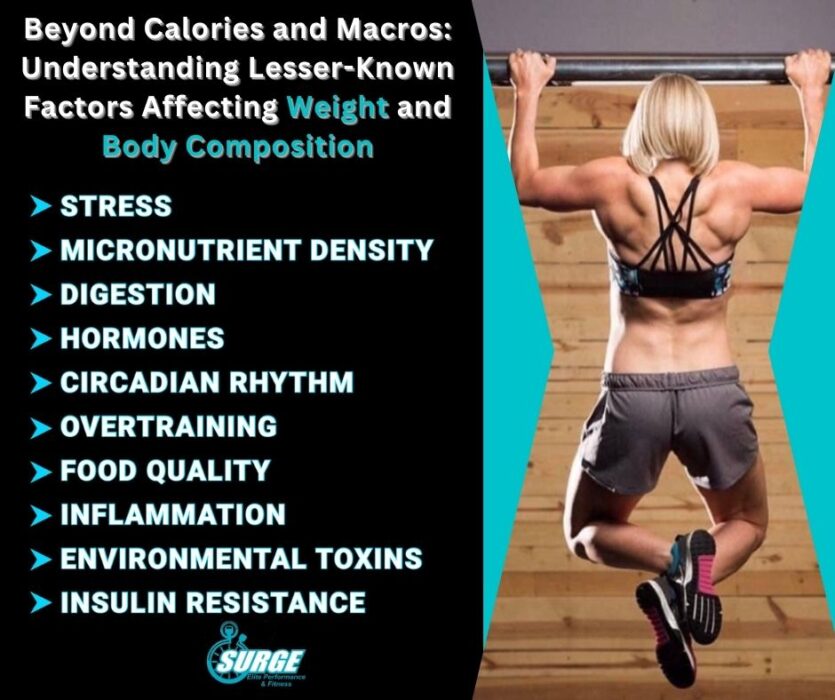
Maintaining a healthy body weight and composition involves more than just watching calorie intake and tracking macronutrients. While these aspects play a crucial role, there are several lesser-known factors that can significantly influence our weight and body composition. Understanding and addressing these factors can be instrumental in achieving our fitness goals. In this article, we explore some of these often-overlooked factors that can impact body weight and composition.
- Stress:
One of the surprising contributors to weight gain is stress. When stress levels are high, our bodies release cortisol, a hormone that promotes fat storage. Consequently, chronic stress can lead to unwanted weight gain. Managing stress through relaxation techniques, exercise, and self-care is essential to maintaining a healthy body composition.
- Digestion and Gut Health:
Poor digestion or imbalanced gut health can hinder nutrient absorption, making it difficult to lose weight or even leading to weight gain. A healthy gut is crucial for breaking down and absorbing nutrients efficiently. Including probiotics and prebiotics in our diet can promote gut health and improve digestion.
- Micronutrient Density:
A diet lacking in essential micronutrients like vitamins and minerals can disrupt our body’s metabolic processes, potentially contributing to weight gain or difficulties in losing weight. Prioritizing a nutrient-rich diet with a variety of fruits, vegetables, and whole foods is vital for achieving and maintaining a healthy weight.
- Hormones:
Hormonal imbalances can significantly impact metabolism and body composition. Conditions such as low thyroid function or elevated estrogen levels can affect how our bodies store and utilize energy. Consulting a healthcare professional to assess and address hormonal imbalances can be beneficial for weight management.
- Circadian Rhythm:
Sleep is essential for maintaining a healthy metabolism and hormone balance. Disruptions to our natural sleep-wake cycle, such as irregular sleep patterns or insufficient sleep, can lead to weight gain. Prioritizing a consistent sleep schedule and creating a sleep conducive environment can positively influence body composition.
- Overtraining:
Exercise is essential for overall health, but excessive training without adequate rest can lead to increased cortisol levels, which promote fat storage. Balancing intense workouts with proper recovery is vital to avoid potential weight related setbacks.
- Food Quality:
The quality of the food we consume plays a significant role in hormonal regulation. Diets high in processed foods and added sugars can disrupt hormone levels, leading to weight gain. Opting for whole, nutrient dense foods can positively impact weight and body composition.
- Inflammation:
Chronic inflammation in the body can hinder weight loss efforts and contribute to weight gain. Incorporating anti-inflammatory foods such as leafy greens, fatty fish, and turmeric can help manage inflammation and support a healthy weight.
- Environmental Toxins:
Exposure to environmental toxins like pesticides, BPA, and phthalates can disrupt our hormonal balance, potentially leading to weight gain. Minimizing exposure to such toxins through conscious choices in food and product selection can be beneficial for overall health and body composition.
- Insulin Resistance:
Insulin resistance occurs when the body becomes less sensitive to insulin, leading to elevated blood sugar levels and potential weight gain. Maintaining a balanced diet and staying physically active can help prevent or manage insulin resistance.
When striving for our weight and body composition goals, it’s essential to look beyond mere calorie counting and macronutrient tracking. Understanding the impact of stress, digestion, hormonal imbalances, sleep patterns, and other lesser-known factors can make a significant difference in our fitness journey. By addressing these aspects and making informed lifestyle choices, we can achieve a healthier and more sustainable body weight and composition. Remember that each individual’s body is unique, so it’s crucial to consult with healthcare professionals or nutrition experts for personalized advice and guidance.
